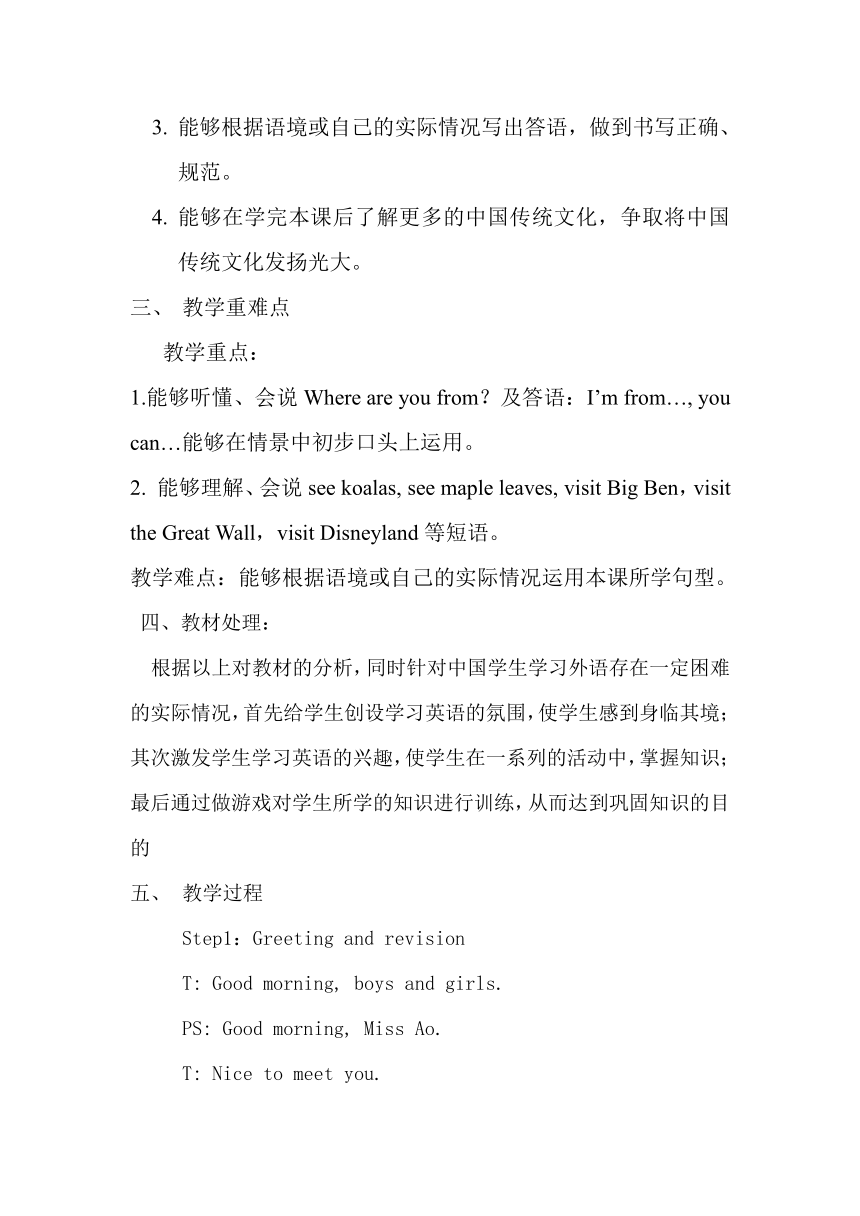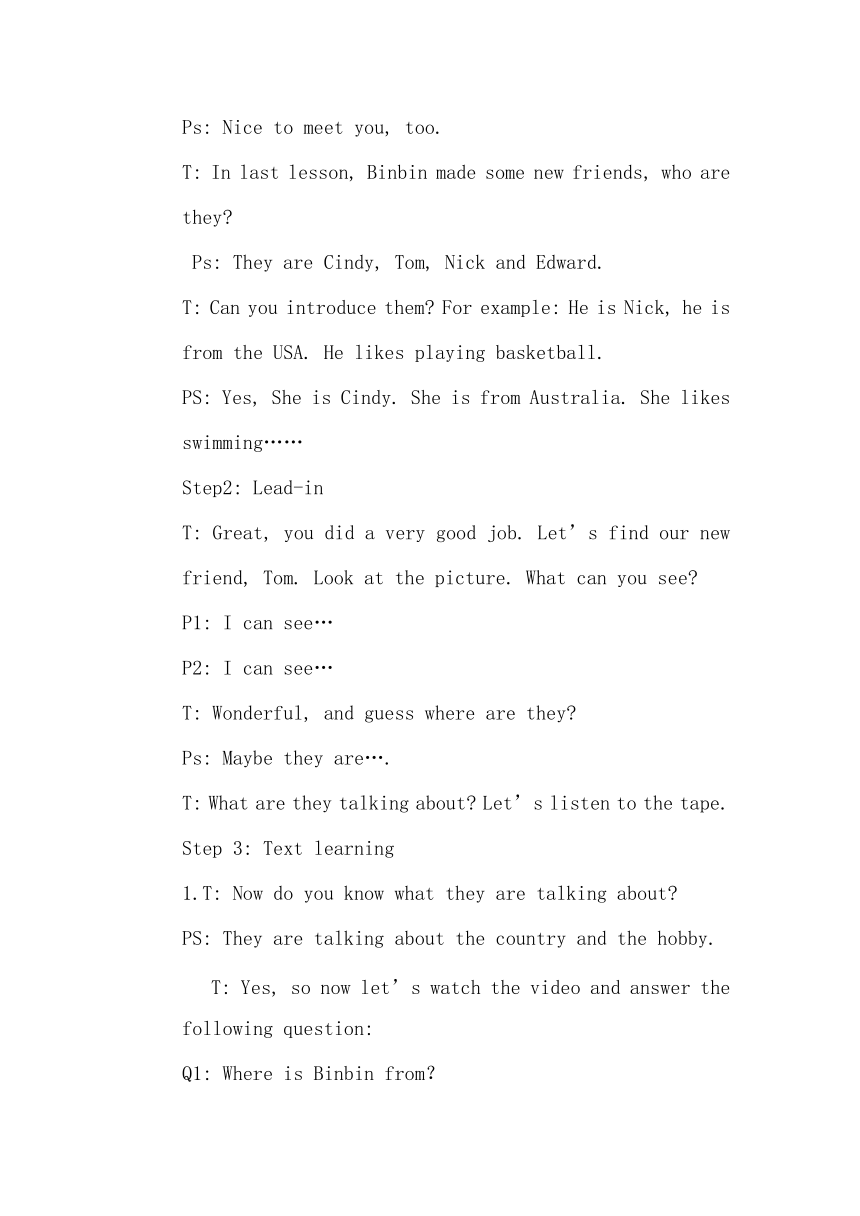Unit 6 Countries Lesson 2 教学设计
文档属性
| 名称 | Unit 6 Countries Lesson 2 教学设计 |  | |
| 格式 | doc | ||
| 文件大小 | 26.5KB | ||
| 资源类型 | 教案 | ||
| 版本资源 | 人教(新起点) | ||
| 科目 | 英语 | ||
| 更新时间 | 2021-04-30 11:24:24 | ||
图片预览



文档简介
人教版一起四下Unit 6 Countries Lesson 2教学设计
教材内容分析
根据《英语新课程标准》的要求,小学阶段的英语课主要是激发学生学习英语的兴趣;培养学生对英语学习的积极态度,使他们建立学习英语的自信心;培养学生一定的语感和良好的语音、语调,为英语的进一步学习打下基础本课时的教学内容为人教版一年级起点四年级下册p61,即A Look, listen and repeat. B Do a survey和C Let’s write. A部分借助对话录音和图片呈现三个基本句型: Where are you from? I’m from…, you can….并通过让学生看、听、说、做等途径来感受并学习这个句型。B部分通过role-play,帮助学生熟悉主要句型,并体会这些句型在交际情景中的运用。同时学习see koalas, see maple leaves, visit Big Ben,visit the Great Wall,visit Disneyland等短语。C部分为让学生根据所给的信息提示,选择本课所学句型完成句子,同时强化良好的英语书写习惯。
教学目标
能够听懂、会说用来询问他人来自哪个国家的功能句:Where are you from?及答语:I’m from…,you can…, 能够在情景中初步口头上运用上述功能句。
能够理解、会说see koalas, see maple leaves, visit Big Ben,visit the Great Wall,visit Disneyland等短语。
能够根据语境或自己的实际情况写出答语,做到书写正确、规范。
能够在学完本课后了解更多的中国传统文化,争取将中国传统文化发扬光大。
教学重难点
教学重点:
1.能够听懂、会说Where are you from?及答语:I’m from…, you can…能够在情景中初步口头上运用。
2. 能够理解、会说see koalas, see maple leaves, visit Big Ben,visit the Great Wall,visit Disneyland等短语。
教学难点:能够根据语境或自己的实际情况运用本课所学句型。
四、教材处理:
根据以上对教材的分析,同时针对中国学生学习外语存在一定困难的实际情况,首先给学生创设学习英语的氛围,使学生感到身临其境;其次激发学生学习英语的兴趣,使学生在一系列的活动中,掌握知识;最后通过做游戏对学生所学的知识进行训练,从而达到巩固知识的目的
教学过程
Step1:Greeting and revision
T: Good morning, boys and girls.
PS: Good morning, Miss Ao.
T: Nice to meet you.
Ps: Nice to meet you, too.
T: In last lesson, Binbin made some new friends, who are they?
Ps: They are Cindy, Tom, Nick and Edward.
T: Can you introduce them? For example: He is Nick, he is from the USA. He likes playing basketball.
PS: Yes, She is Cindy. She is from Australia. She likes swimming……
Step2: Lead-in
T: Great, you did a very good job. Let’s find our new friend, Tom. Look at the picture. What can you see?
P1: I can see…
P2: I can see…
T: Wonderful, and guess where are they?
Ps: Maybe they are….
T: What are they talking about? Let’s listen to the tape.
Step 3: Text learning
1.T: Now do you know what they are talking about?
PS: They are talking about the country and the hobby.
T: Yes, so now let’s watch the video and answer the following question:
Q1: Where is Binbin from?
Q2:Where is Tom from?
(After listening, students answer the questions.)
2.T: OK, now let’s listen again, then find: What are their hobbies?
(Listen again, then students answer the question.)
T: Good, now we know Tom is from the UK. Look, this is the map of the UK, please discuss in pairs and find: What interesting things can you do in the UK?
(Discuss in pairs)
PS:…
3.T: Let’s find the answer together. And then read the text together.
4.T:You can visit Big Ben in the UK. So Tom is from the UK, you can visit Big Ben in his country. How about our other new friends, what interesting things can you do in their countries?
(The same way to learn see koalas, see maple leaves, visit the Great Wall,visit Disneyland)
Step4: Practice
T: Let’s practice the dialogue like this:
--Where are you from?
---I’m from .
--You can …in my country.
Ps:…
Step 5 Production
T: You know so much about our new friends today, do you want to know me, and do you want to know more about me? My English name? My hobby? My country and what interesting things can you do in my country?
PS: Yes.
T: Here is the example of my self-introduction, can you introduce yourself?
PS:…
T: Please take out your paper, work in pairs and choose a country which you like, and then make a new dialogue
PS:…
Step 6 Emotional production.
T: In China we can visit the Great Wall, we can see pandas, and there are so many interesting things we can do. (play the video)
PS:…
T: So boys and girls, you should study harder, carry forward the glorious Chinese traditional culture in the future.
Step 7: Homework
教材内容分析
根据《英语新课程标准》的要求,小学阶段的英语课主要是激发学生学习英语的兴趣;培养学生对英语学习的积极态度,使他们建立学习英语的自信心;培养学生一定的语感和良好的语音、语调,为英语的进一步学习打下基础本课时的教学内容为人教版一年级起点四年级下册p61,即A Look, listen and repeat. B Do a survey和C Let’s write. A部分借助对话录音和图片呈现三个基本句型: Where are you from? I’m from…, you can….并通过让学生看、听、说、做等途径来感受并学习这个句型。B部分通过role-play,帮助学生熟悉主要句型,并体会这些句型在交际情景中的运用。同时学习see koalas, see maple leaves, visit Big Ben,visit the Great Wall,visit Disneyland等短语。C部分为让学生根据所给的信息提示,选择本课所学句型完成句子,同时强化良好的英语书写习惯。
教学目标
能够听懂、会说用来询问他人来自哪个国家的功能句:Where are you from?及答语:I’m from…,you can…, 能够在情景中初步口头上运用上述功能句。
能够理解、会说see koalas, see maple leaves, visit Big Ben,visit the Great Wall,visit Disneyland等短语。
能够根据语境或自己的实际情况写出答语,做到书写正确、规范。
能够在学完本课后了解更多的中国传统文化,争取将中国传统文化发扬光大。
教学重难点
教学重点:
1.能够听懂、会说Where are you from?及答语:I’m from…, you can…能够在情景中初步口头上运用。
2. 能够理解、会说see koalas, see maple leaves, visit Big Ben,visit the Great Wall,visit Disneyland等短语。
教学难点:能够根据语境或自己的实际情况运用本课所学句型。
四、教材处理:
根据以上对教材的分析,同时针对中国学生学习外语存在一定困难的实际情况,首先给学生创设学习英语的氛围,使学生感到身临其境;其次激发学生学习英语的兴趣,使学生在一系列的活动中,掌握知识;最后通过做游戏对学生所学的知识进行训练,从而达到巩固知识的目的
教学过程
Step1:Greeting and revision
T: Good morning, boys and girls.
PS: Good morning, Miss Ao.
T: Nice to meet you.
Ps: Nice to meet you, too.
T: In last lesson, Binbin made some new friends, who are they?
Ps: They are Cindy, Tom, Nick and Edward.
T: Can you introduce them? For example: He is Nick, he is from the USA. He likes playing basketball.
PS: Yes, She is Cindy. She is from Australia. She likes swimming……
Step2: Lead-in
T: Great, you did a very good job. Let’s find our new friend, Tom. Look at the picture. What can you see?
P1: I can see…
P2: I can see…
T: Wonderful, and guess where are they?
Ps: Maybe they are….
T: What are they talking about? Let’s listen to the tape.
Step 3: Text learning
1.T: Now do you know what they are talking about?
PS: They are talking about the country and the hobby.
T: Yes, so now let’s watch the video and answer the following question:
Q1: Where is Binbin from?
Q2:Where is Tom from?
(After listening, students answer the questions.)
2.T: OK, now let’s listen again, then find: What are their hobbies?
(Listen again, then students answer the question.)
T: Good, now we know Tom is from the UK. Look, this is the map of the UK, please discuss in pairs and find: What interesting things can you do in the UK?
(Discuss in pairs)
PS:…
3.T: Let’s find the answer together. And then read the text together.
4.T:You can visit Big Ben in the UK. So Tom is from the UK, you can visit Big Ben in his country. How about our other new friends, what interesting things can you do in their countries?
(The same way to learn see koalas, see maple leaves, visit the Great Wall,visit Disneyland)
Step4: Practice
T: Let’s practice the dialogue like this:
--Where are you from?
---I’m from .
--You can …in my country.
Ps:…
Step 5 Production
T: You know so much about our new friends today, do you want to know me, and do you want to know more about me? My English name? My hobby? My country and what interesting things can you do in my country?
PS: Yes.
T: Here is the example of my self-introduction, can you introduce yourself?
PS:…
T: Please take out your paper, work in pairs and choose a country which you like, and then make a new dialogue
PS:…
Step 6 Emotional production.
T: In China we can visit the Great Wall, we can see pandas, and there are so many interesting things we can do. (play the video)
PS:…
T: So boys and girls, you should study harder, carry forward the glorious Chinese traditional culture in the future.
Step 7: Homework
